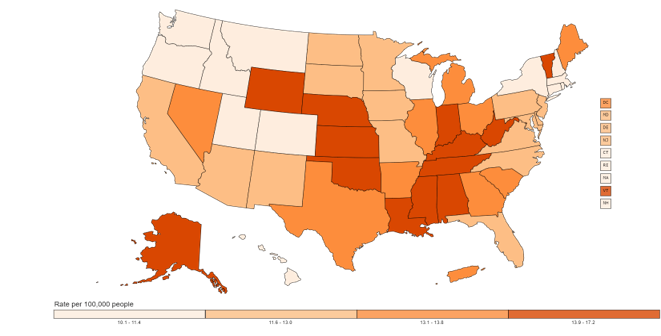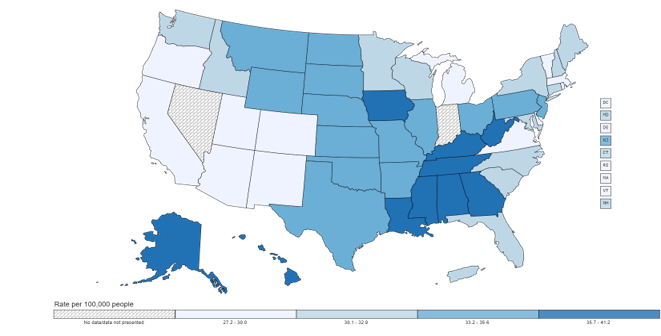NATIONAL COLON CANCER AWARENESS MONTH
March is National Colon Cancer Awareness Month
Colon Cancer is the second leading cancer cause of death in the U.S. Kentucky is among the top states in the U.S. for the number of deaths related to colon cancer, with a rate of 15.6 per 100k, or 886 deaths in 2020.

Source – U.S. Cancer Statistics Working Group. U.S. Cancer Statistics Data Visualizations Tool, based on 2022 submission data (1999-2020): U.S. Department of Health and Human Services, Centers for Disease Control and Prevention and National Cancer Institute; https://www.cdc.gov/cancer/dataviz, released in November 2023.
On in every five deaths in the United States is due to cancer. Kentucky is among the top states in the U.S. for the number of new colon cancer diagnoses at a rate of 41.2 per 100k, or 2,279 new diagnoses a year, 2020.

Source – U.S. Cancer Statistics Working Group. U.S. Cancer Statistics Data Visualizations Tool, based on 2022 submission data (1999-2020): U.S. Department of Health and Human Services, Centers for Disease Control and Prevention and National Cancer Institute; https://www.cdc.gov/cancer/dataviz, released in November 2023.
Screening can find precancerous polyps – abnormal growths in the colon or rectum that can be removed before they turn into cancer.
Screening also helps find colorectal cancer at an early stage, when treatment works best.
When should I have a screening?
45 is the new 50!
If you are aged 45 or older, contact your physician to get screened now.
If you missed a screening in 2020 or 2021 because of the pandemic, contact your physician to schedule your screening as soon as possible.
Those under age 45 at increased risk may need to start screening sooner. Talk with your doctor to see when you should start screening if you think you are at an increased risk.
Your doctor can discuss the testing option(s) best for you, when to get screened, and how often.

What are the risk factors?
Your risk of getting colorectal cancer increases as you age but getting regular physical activity and keeping a healthy weight may help lower your risk.
Other risk factors include having conditions such as:
- Inflammatory bowel diseases such as Crohn’s disease or ulcerative colitis.
- A personal family history of colorectal cancer or colorectal polyps.
- A genetic syndrome such as familial adenomatous polyposis (FAP) or hereditary non-polyposis colorectal cancer (Lynch syndrome).
Lifestyle factors that may contribute to an increased risk of colorectal cancer include:
- Lack of regular physical activity.
- A diet low in fruit and vegetables.
- A low-fiber and high-fat diet, or a diet high in processed meats.
- Overweight and obesity.
- Alcohol consumption.
- Tobacco use.

Reducing alcohol consumption and tobacco use, losing weight, and getting regular physical exercise may help reduce your risk of colorectal cancer.
- Published: February 28, 2022
- Page reviewed/updated: March 6, 2024



